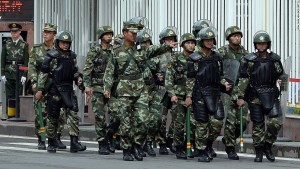How China uses fear of terrorism to justify increased state power
CNN, 10 June 2016
By Michael Clarke – China’s long-simmering problems with Uyghur separatism and terrorism in the western region of Xinjiang has been thrust again into the international spotlight.
The U.S. State Department has criticized China’s “lack of transparency” regarding its claims of Uyghur terrorism in Xinjiang, questioned Beijing’s stated desire for greater counter-terrorism cooperation with the U.S., and said Chinese policies in the region “may have exacerbated ethnic tension” and contributed to “increased violent extremism.”
State media in Xinjiang reported this week that some Uyghur inhabitants would be required to provide DNA samples, fingerprints and a “three-dimensional image,” when applying for passports or other travel documents.
China has dismissed criticism of its policies in the region as “inaccurate and “un-objective.”
It is clear however that Beijing has increasingly instrumentalized the threat of terrorism in both domestic and foreign policy.
While China’s claims of links between Uyghur groups and global jihadist organizations are over-stated, connections are growing. This, combined with increased incidences of terrorism within China has permitted Beijing to both justify its hardline repression of dissent in Xinjiang and link it to global efforts to combat terrorism.
China, terrorism and ISIS
China has claimed that hundreds, even thousands, of Uyghurs are traveling to Syria to fight with rebel groups there, including ISIS.
In 2014, ISIS leader Abu Bakr Al Baghdadi argued that China was on par with states such as Israel, India and the U.S. as an “oppressor” of Muslims, while the release of a Mandarin-language propaganda video confirmed for some the group’s desire to target China.
Official assertions of the scale of ISIS recruitment of Uyghurs are difficult to corroborate. While the Turkestan Islamic Party (TIP), a group China has previously blamed for attacks in Xinjiang, has a small presence in Syria, it is linked to Al Qaeda-affiliate Jabhat al Nusra, not ISIS.
Uyghur terrorism and national security
Beijing is focused on cementing a “discourse of danger” around Xinjiang for use both externally and domestically.
Officials have long claimed that Uyghur separatism and opposition is inspired and supported by external sources. Since 9/11, Beijing has appropriated the lexicon of the “war on terror” to link Uyghur opposition groups to transnational jihadist organizations.
Following inter-ethnic riots in Urumqi in 2009, Beijing rapidly increased Xinjiang’s annual counter-terrorism budget from around $241 million in 2009 to more than $930 million in 2014.
A major part of this increased spending has included the extension of China’s electronic surveillance system, “Skynet,” into the region.
In 2014, Beijing established the National Security Commission, passing the country’s first counter-terrorism legislation the following year.
The NSC has made “national security” synonymous with state or regime security, while the new legislation provides legal basis for security services to identify and suppress individuals or groups deemed to be “terrorists,” and requires internet providers and tech companies to provide assistance, including encryption keys, during counter-terrorism operations.
State security ascendant
While official pronouncements stress that the law’s primary purpose is to strengthen Beijing’s ability to ensure the security and safety of the country’s citizenry and interests at home and abroad, a closer examination suggests that ensuring the security of the state lies at its heart.
Since coming to power, President Xi Jinping has focused on two core domestic security issues: Xinjiang and wenwei, or “stability maintenance,” campaigns.
Under Xi, the threat of terrorism in Xinjiang has been instrumentalized nationwide to assist in Communist Party efforts to maintain “stability.”
“The mobilization of the Uyghur terror threat,” as Tom Cliff has recently argued, is “not simply about preventing terror attacks on Han civilians—it is primarily about rapidly or even pre-emptively ‘harmonizing’ potentially unstable elements of the Han population itself.”
Two of the Communist Party’s core interests — the security of the one-party state, and “stability” in Xinjiang — have thus become increasingly intersected.
http://edition.cnn.com/2016/06/08/asia/china-xinjiang-terrorism-clarke/index.html?eref=rss_latest


